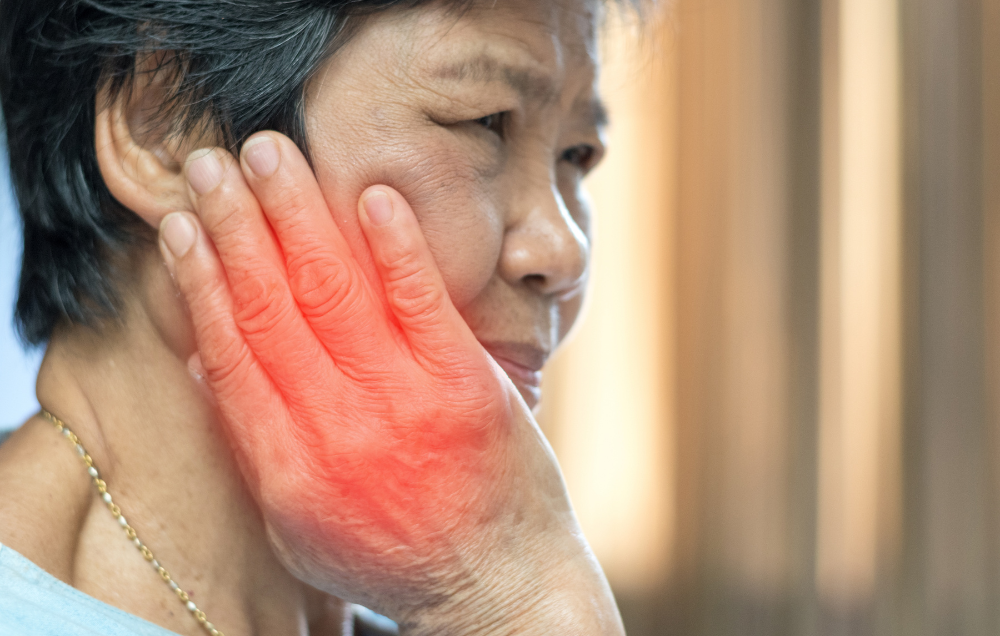Contents
TMJ disorder refers to conditions that impact the temporomandibular joint’s ability to function. The temporomandibular joint (TMJ) is the joint that keeps your jaw and skull connected. It’s located on the sides of your face, near the front of your ears. When this joint isn’t functioning properly, it can cause a lot of issues. A TMJ disorder can lead to symptoms including pain, stiffness and jaw locking. Also known as TMJ dysfunction, a TMJ disorder can make it hard to use your jaw. You may feel unable to chew, speak or even open your mouth without feeling discomfort.
TMJ symptoms aren’t static. People who experience TMJ dysfunction often experience symptoms in waves. A period when TMJ symptoms become more intense or new symptoms develop is called a flare-up. If you experience TMJ flare-ups, you’re not alone. One study estimates that in 2018, almost 5% of the adult population in the United States had TMJ pain. Acute jaw pain is one of the main symptoms of TMJ disorder flare-ups.
If you want to avoid future flare-ups, looking out for triggers can help. Flare-ups typically don’t occur in a vacuum. If your TMJ dysfunction is flaring up, there may be one or more contributing factors. Learning about some potential causes behind TMJ dysfunction flare-ups can help you avoid triggers and keep your symptoms under control.
5 potential triggers for TMJ flare-ups
- Stress — Stress is one of the most common triggers for TMJ flare-ups. When you’re stressed or anxious, you may carry more tension around your neck and shoulders. This can lead to muscle tightness at the jaw. Stress can also cause you to habitually clench your jaw or grind your teeth. This can further contribute to jaw tension. Increased tension around the jaw joint can lead to flare-ups of TMJ dysfunction symptoms. If you’re often stressed, you may experience persistent discomfort around your jaw. Left untreated, your symptoms could continue to flare up and worsen. Improving your physical and mental well-being may help you find relief.
- Poor posture — Your posture can have a major impact on your physical health. While you might think of your posture as primarily affecting your back, it can affect your jaw function too. Slouching or hunching your neck forward can put strain on your neck. When your neck muscles are tight, they can put pressure on your jaw that leads to referred pain. Because of this, poor posture can indirectly cause TMJ flare-ups. Maintaining good posture can help you manage your symptoms. Not sure where to start? A physical therapist can work with you to correct your posture and overall biomechanics, enabling you to move through life more comfortably and efficiently.
- Bruxism — Bruxism refers to repetitive jaw movements that create pressure and stress. Unconscious behaviors like grinding your teeth or clenching your jaw can cause the jaw joint to become inflamed. Bruxism can occur during the day or night. If you’re experiencing bruxism, you may be able to address your condition by alleviating tension around your jaw. Wearing a mouthguard while sleeping can help as well. You may also be able to consciously avoid the behaviors associated with bruxism. People experiencing bruxism often don’t realize they’re grinding their teeth until they start to experience symptoms like jaw pain. By taking a proactive approach to bruxism prevention, you may be able to avoid TMJ flare-ups in the future.
- Certain foods — TMJ dysfunction can make your jaw highly sensitive. Any movement that puts pressure on your jaw can aggravate your condition, leading to your symptoms flaring up. If you have TMJ dysfunction, you may want to avoid certain foods that require intensive chewing. Foods that are hard or chewy may be especially difficult to eat. Foods that could aggravate your condition include steak, nuts and candy. Chewing gum may be painful as well. Your physical therapist can work with you to make dietary adjustments that accommodate your jaw dysfunction while you work toward long-term recovery.
- Injury — A recent neck or jaw injury could be contributing to your TMJ flare-ups. If you were already experiencing TMJ dysfunction before your injury, sudden physical trauma can trigger further discomfort and new symptoms. An injury could also be the root cause behind all of your TMJ issues. Injuries around the jaw may continue to have lingering effects such as lasting tissue sensitivity once they’ve healed.
How long does a TMJ flare-up last?
Understanding the typical timeline can help you prepare for future flare-ups. TMJ flare-up duration tends to vary. Some flare-ups can persist for several days, while others only last for a few hours. Minor flare-ups tend to resolve within a day. The length of your flare-ups will depend on the severity of your condition and the cause of your pain. If your flare-ups are caused by eating hard foods, for example, you may only experience worsened symptoms for an hour or two after eating. Flare-ups caused by chronic conditions, however, may extend for much longer periods of time.
Treatment can shorten the duration of your TMJ flare-ups. With rest, exercise and physical therapy, you can reduce the duration and intensity of your symptoms. By addressing the cause of your flare-ups directly, you can even prevent future flare-ups, allowing you to experience lasting relief.
How to treat TMJ flare-ups
Top treatment approaches for TMJ pain include:
- Rest — TMJ disorder is often caused by overuse. Whether overusing your jaw has led to an injury or just created muscle tension, you may be feeling discomfort as a result of using your jaw too much. One of the best solutions for this is rest. Try to avoid jaw movements that might aggravate your condition. When eating, opt for soft foods like soups and smoothies. This can help give your jaw a break while it recovers.
- Jaw exercises — For an active approach to TMJ dysfunction recovery, jaw exercises can be a great option. With gentle stretches and targeted exercises recommended by your physical therapist, you can start restoring your jaw function and reducing your discomfort. Working with your physical therapist to find the right exercises is important, as some intensive exercises may actually exacerbate your symptoms. Your physical therapist can help you find jaw exercises that promote healing without making your symptoms flare up.
- Physical therapy — Physical therapy is more than exercise. In addition to building a tailored exercise regimen, your physical therapist can provide care through an array of specialized treatment modalities. Treatment methods like hands-on manual therapy can be great for relieving pressure and improving circulation around your jaw muscles. Individualized care is a major benefit of physical therapy. When you’re receiving treatment, your physical therapist will work with you one-on-one to find and apply solutions that match with your personal needs and recovery goals.
Get help preventing TMJ flare-ups at Lattimore Physical Therapy
Lattimore Physical Therapy is here to help. With a range of treatment techniques designed to address the root causes of TMJ dysfunction, we can support you each step of the way as you work toward long-term relief.
Contact our team today for more information about TMJ disorder and treatments or to schedule an initial appointment.


